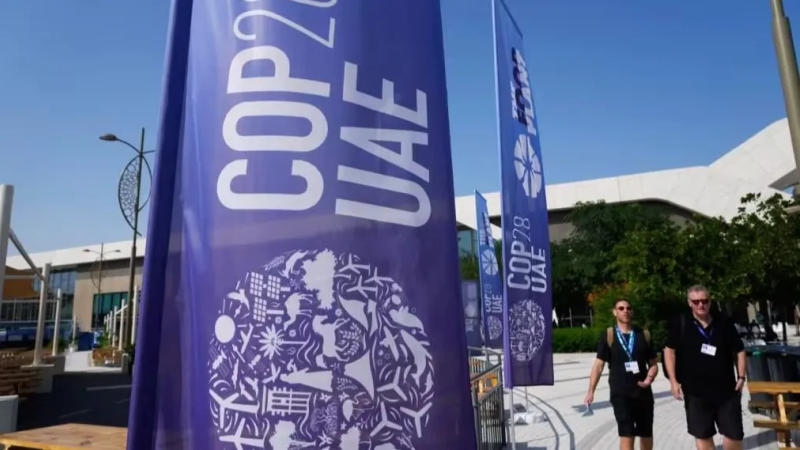Published 16:25 IST, December 5th 2023
To phase out or phase down fossil fuels? That is big question at COP28 climate talks
After days of shaving off the edges of key warming issues, climate negotiators on Tuesday zeroed in on the tough job of dealing with the main cause of what's overheating the planet: fossil fuels.

After days of shaving off the edges of key warming issues, climate negotiators on Tuesday zeroed in on the tough job of dealing with the main cause of what's overheating the planet: fossil fuels. As scientists, activists and United Nations officials repeatedly detailed how the world needs to phase-out the use of coal, oil and natural gas, the United Arab Emirates-hosted conference opened “energy transition day” with a session headlined by top officials of two oil companies.
Negotiators produced a new draft of what's expected to be the core document of the UN talks, something called the Global Stocktake, but it had so many possibilities in its 24-pages that it didn't give too much of a hint of what will be agreed upon when the session ends next week. Whatever is adopted has to be agreed on by consensus so it has to be near unanimous.
“The central issue of this COP, the global stocktake, is to reach a conclusion about the phasing out of fossil fuels,” said climate scientist Bill Hare, CEO of Climate Analytics. “And unless we do that, I doubt whether we're going to see an improvement in temperature.” The discussions on the global stocktake makes the climate talks in Dubai “a moment of reflection,” said World Resources Institute international climate action director David Waskow.
“It spotlights whether we are doing enough to curb emissions, adapt and prepare for climate change and increase finance from developed countries to developing countries.” The options in the draft range from a less-stringent “phasedown of unabated coal power" to a simple but dramatic “an orderly and just phase out of fossil fuels.” Scientists who track climate action said it's crucial to watch the language for loopholes.
“We need to phase out of fossil fuels completely without a back door,” said New Climate Institute's Niklas Hohne. “At this conference, there's actually many back doors being proposed at the briefing table ... mainly for prolonging the life of fossil fuels, and one is to talk about 'unabated' fossil fuels.” Including “unabated” means allowing the burning of fossil fuels if their emissions can be captured and stored, a technology that's much talked about but really hasn't proven to work well, Hohne and other scientists have said.
Hohne and Hare's organisations on Tuesday released an updated version of the Climate Action Tracker, which looks at pledges, policies and actions by nations and tries to calculate what kind of temperature increases that means. It found, based on pledges, the world is going in the wrong direction.
A year ago the world's pledges, if fulfilled, would lead to 2.4 degrees Celsius (4.3 degrees Fahrenheit) of warming over pre-industrial times, but now it's up to 2.5 degrees (4.5 Fahrenheit). That's because several nations with weak pledges — especially Indonesia and Iran — have increased emissions so much that the world is heading more on a warmer track, said report lead author Claire Stockwell of Climate Analytics.
“We haven't really seen any action from governments,” Stockwell said.
“Many, many countries still fund significant fossil fuel expansion,” said New Climate Institute analyst Ana Missirliu. “And in the last year since the previous COP, we've seen quite a cascade of worrying announcements actually starting with the (host country) UAE, whose $150 billion investment plan to expand its oil and gas industry largely — very largely — overshadows its recent renewable energy investment plans.” Missirliu also pointed to fossil fuel production expansion in the United States, United Kingdom and Saudi Arabia.
However, one bright spot is that China, the world's biggest carbon polluter, is now set to hit peak emissions in 2025, years earlier than pledged, and by 2035 will be down to about 2017 levels, Stockwell said. Activists had a series of events and actions lined up Tuesday at the summit seeking to amp up pressure on conference participants to agree to phase out — not down — coal, oil and gas, responsible for most of the world's emissions, and move to clean energy in a fair way.
A team of scientists reported Tuesday that the world pumped 1.1 per cent more heat-trapping carbon dioxide into the air than last year. Protests — which are limited to “action zones” around the UN site — centred on phasing out fossil fuels and calling for finance to ramp up the move to clean energy. Over 100 countries have pledged to triple their renewable capacity and double energy efficiency by the end of the decade.
Updated 16:26 IST, December 5th 2023




